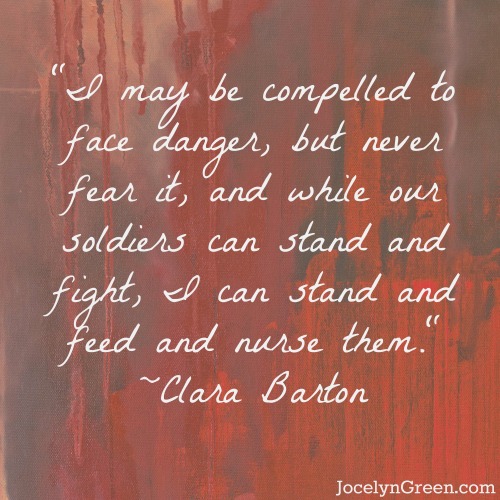
Clara Barton, the most famous Civil War nurse, was born on December 25, 1821 (yes we're celebrating a little early). Fiercely independent and devoted to her causes, yet given to paranoia and depressive episodes, she led a fascinating life. She continued her service after the war ended by opening the Missing Soldiers' Office in Washington, D.C. to help family members find the remains of their loved ones. By 1869, she had identified 22,000 missing men and received and responded to 63,182 letters from those trying to locate their soldiers. Later, Clara brought a chapter of the International Red Cross to life in America. Read her full bio here and/or watch the brief video below.
Here is another great Web page, Historical Nurses: All About Clara Barton, which includes more than a dozen helpful links for further exploration.
To give you just a glimpse of her nursing days in the Civil War, I'm sharing the following excerpt from my book Stories of Faith and Courage from the Home Front:
In the Line of Fire
Though it was only a little after noon, Clara Barton could not see the sun. The smoke at Antietam, Maryland, was so dense it clouded her vision, and the hot sulphurous breath of battle parched her mouth until her lips cracked and bled. At her feet, a man lying on the ground asked her for a drink. Kneeling at his side, she raised and held him with her right hand. “Just at this moment,” she later recalled, “a bullet sped its free and easy way between us, tearing a hole in my sleeve and found its way into his body. He fell back dead.” Soon after, she encountered a man with a bullet still buried in his face. Knowing the surgeons were occupied with more serious operations, he implored her to use her pocketknife to carve out the ball herself.
This was a new call. I had never severed the nerves and fibers of human flesh, and I said I could not hurt him so much. He looked up, with as nearly a smile as such a mangled face could assume, saying, “You cannot hurt me, dear lady, I can endure any pain that your hands can create. Please do it. It will relieve me so much.” I could not withstand his entreaty and opening the best blade of my pocket knife, prepared for the operation . . . I extracted the ball and washed and bandaged the face. . . . I assisted the sergeant to lie down again, brave and cheerful as he had risen, and passed on to others.
Though she is the Civil War’s most famous field nurse, Clara Barton wasn’t the only one to put herself in harm’s way to care for soldiers even before the bullets stopped flying. Alabama’s Juliet Opie Hopkins was hit twice in the leg at Seven Pines, Michigan’s Annie Ethridge was wounded in the hand at Chancellorsville, and New York’s Elmina Spencer, was shot through the sciatic nerve at City Point, Virginia. Yet none of these women left the service of nursing.
Prayer: Lord, make me strong for the tasks you have called me to do. Give me courage to persevere even under trials.
“She sets about her work vigorously; her arms are strong for her tasks.” ~Proverbs 31:17
_________________________________
If you're interested in a closer look at Civil War nursing, I encourage you to take a look at this PDF guide I created to accompany Wedded to War, my novel about women nurses during the war. I designed it with homeschooling high schoolers in mind, but anyone with an interest in digging deeper into the topic will enjoy it.



Comments
Add new comment